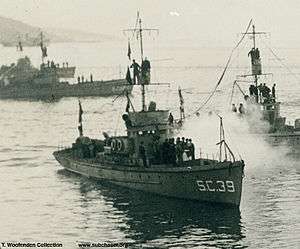USS SC-39
 Submarine Chaser No. 39, later SC-39, with other SC-1-class submarine chasers. | |
| History | |
|---|---|
| Name: |
|
| Builder: | New York Navy Yard, Brooklyn, New York |
| Commissioned: | 1[1] or 2[2] March 1918 |
| Reclassified: | SC-39 on 17 July 1920 |
| Fate: | Sold 24 June 1921 |
| General characteristics | |
| Class and type: | SC-1-class submarine chaser |
| Displacement: |
|
| Length: |
|
| Beam: | 14 ft 9 in (4.50 m) |
| Draft: |
|
| Propulsion: | Three 220 bhp (160 kW) Standard Motor Construction Company six-cylinder gasoline engines, three shafts, 2,400 US gallons (9,100 L) of gasoline; one Standard Motor Construction Company two-cylinder gasoline-powered auxiliary engine |
| Speed: | 18 knots (33 km/h) |
| Range: | 1,000 nautical miles (1,900 km) at 10 knots (19 km/h) |
| Complement: | 27 (2 officers, 25 enlisted men) |
| Sensors and processing systems: | One Submarine Signal Company S.C. C Tube, M.B. Tube, or K Tube hydrophone |
| Armament: |
|
USS SC-39, until July 1920 known as USS Submarine Chaser No. 39 or USS S.C. 39, was an SC-1-class submarine chaser built for the United States Navy during World War I.
SC-39 was a wooden-hulled 110-foot (34 m) submarine chaser built at the New York Navy Yard at Brooklyn, New York. She was commissioned there on 1[1] or 2[2] March 1918 as USS Submarine Chaser No. 39, abbreviated at the time as USS S.C. 39.
Submarine Chaser No. 39 served at Base 27, Plymouth, England, during World War I.
When the U.S. Navy adopted its modern hull number system on 17 July 1920, Submarine Chaser No. 39 was classified as SC-39 and her name was shortened to USS SC-39.
On 24 June 1921, the Navy sold SC-39 to Joseph G. Hitner of Philadelphia, Pennsylvania.
Notes
- 1 2 The Subchaser Archives: The History of U.S. Submarine Chasers in the Great War Hull number: SC-39.
- 1 2 Dictionary of American Naval Fighting Ships at http://www.history.navy.mil/danfs/sc1/sc-1-sc-100v1.htm and NavSource Online: Submarine Chaser Photo Archive: SC-39.
References
- This article incorporates text from the public domain Dictionary of American Naval Fighting Ships. The entry can be found here.
- NavSource Online: Submarine Chaser Photo Archive: SC-39
- The Subchaser Archives: The History of U.S. Submarine Chasers in the Great War Hull number: SC-39
- Woofenden, Todd A. Hunters of the Steel Sharks: The Submarine Chasers of World War I. Bowdoinham, Maine: Signal Light Books, 2006. ISBN 978-0-9789192-0-7.
This article is issued from
Wikipedia.
The text is licensed under Creative Commons - Attribution - Sharealike.
Additional terms may apply for the media files.